The key to happiness in Islam
Life and happiness in Islam
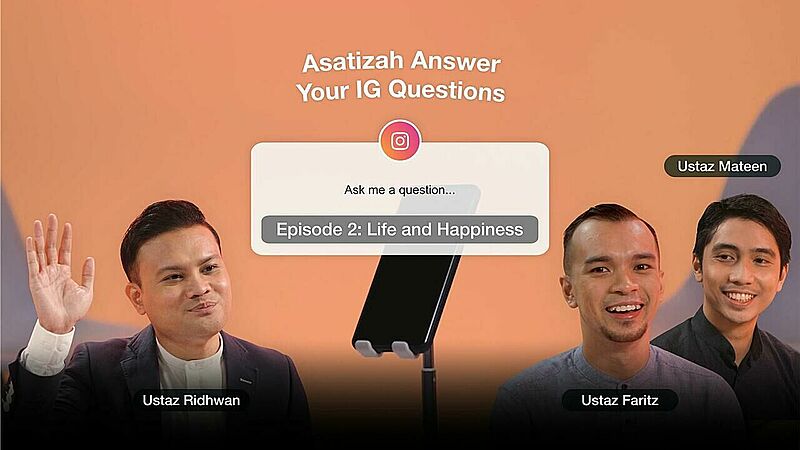
Screengrab from How to be Happy and Successful in Life
It is natural for human beings to seek happiness and success: things that bring us joy and bliss.
We constantly ask questions like, “What makes us happy?” “How can we truly be happy?” “What is success?” and “Is Happiness interlinked with success?”, as we rethink the purpose of our lives. Moreover, in today’s pandemic situation, we rethink what can make us truly happy people?
We may find the answers to these questions by pondering on the eternal guidance that our beloved Prophet Muhammad s.a.w. left us with. Through the Quran, and studying the life of Prophet s.a.w, we can find some lessons on how to achieve happiness and attain success in our lives.
Here are questions we gathered from Muslim.Sg Instagram followers that we got religious teachers to answer.
1. What is true success in Islam?
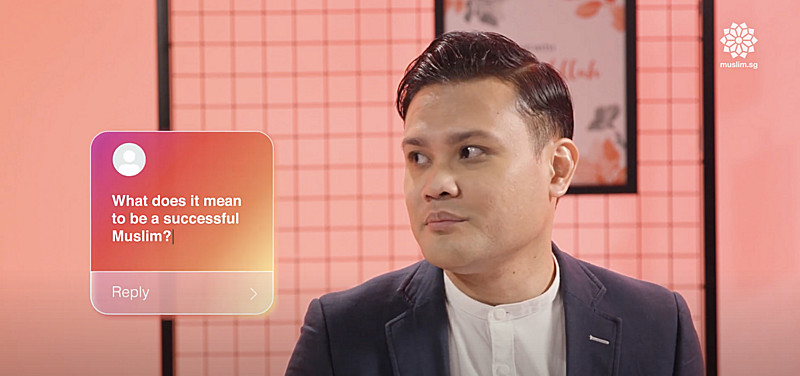
Screengrab from How to be Happy and Successful in Life
For many, success could mean achieving our financial goals, securing the perfect job, being known and acknowledged by many, or perhaps finding the ideal partner. Success, in this sense, is a relative expression of what a person intends to fulfil in life which varies from one person to another. But there are also definite guidelines of what success is in the Quran.
To answer this question, we must first draw out our journey in life. As Muslims, we believe that there are two parts to life. Our life does not end in this world but continues to the next - The Akhirah (Afterlife).
Read: 5 reflections on the journey of life
Success, therefore, means to be successful in this life and the next. This can mean to be successful financially or academically in this world, as mentioned above, while also achieving a successful outcome in the Hereafter, thus, the Paradise. This outlook of success can be seen in the Quranic supplication we often make after our prayer:
رَبَّنَآ ءَاتِنَا فِى ٱلدُّنْيَا حَسَنَةً وَفِى ٱلْـَٔاخِرَةِ حَسَنَةً وَقِنَا عَذَابَ ٱلنَّارِ
Our Lord! Grant us the good of this world and the Hereafter, and protect us from the torment of the Fire.
(Surah Al-Baqarah, 2:201)
While we seek success for both worlds, it's important to note that our definition of success in this world should not be at the cost of our success in the Hereafter. For example, we should avoid financial fulfilment through religiously forbidden means such as gambling or through unethical work that involves taking the legal rights of others.
أُو۟لَـٰٓئِكَ ٱلَّذِينَ ٱشْتَرَوُا۟ ٱلْحَيَوٰةَ ٱلدُّنْيَا بِٱلْـَٔاخِرَةِ ۖ فَلَا يُخَفَّفُ عَنْهُمُ ٱلْعَذَابُ وَلَا هُمْ يُنصَرُونَ
These are the ones who trade the Hereafter for the life of this world. So their punishment will not be reduced, nor will they be helped.
(Surah Al-Baqarah, 2:86)
On the other hand, there are also those who may not have been blessed with financial stability or may even face injustices, but stayed true to their faith and remained virtuous in facing the challenges. These are people who Allah promised inevitable success in the Hereafter:
وَٱصْبِرْ فَإِنَّ ٱللَّهَ لَا يُضِيعُ أَجْرَ ٱلْمُحْسِنِينَ
And be patient! Certainly, Allah does not let the rewards of those who do good go to waste.
(Surah Hud, 11:115)
In fact, the Quran also describes the qualities of those who are successful, that perhaps can guide us to develop the virtues in our lives as well. Such as in Surah Al-Mukminun:
قَدْ أَفْلَحَ ٱلْمُؤْمِنُونَ. ٱلَّذِينَ هُمْ فِى صَلَاتِهِمْ خَـٰشِعُونَ. وَٱلَّذِينَ هُمْ عَنِ ٱللَّغْوِ مُعْرِضُونَ. وَٱلَّذِينَ هُمْ لِلزَّكَوٰةِ فَـٰعِلُونَ. وَٱلَّذِينَ هُمْ لِفُرُوجِهِمْ حَـٰفِظُونَ. إِلَّا عَلَىٰٓ أَزْوَٰجِهِمْ أَوْ مَا مَلَكَتْ أَيْمَـٰنُهُمْ فَإِنَّهُمْ غَيْرُ مَلُومِينَ. فَمَنِ ٱبْتَغَىٰ وَرَآءَ ذَٰلِكَ فَأُو۟لَـٰٓئِكَ هُمُ ٱلْعَادُونَ. وَٱلَّذِينَ هُمْ لِأَمَـٰنَـٰتِهِمْ وَعَهْدِهِمْ رَٰعُونَ. وَٱلَّذِينَ هُمْ عَلَىٰ صَلَوَٰتِهِمْ يُحَافِظُونَ. أُو۟لَـٰٓئِكَ هُمُ ٱلْوَٰرِثُونَ. ٱلَّذِينَ يَرِثُونَ ٱلْفِرْدَوْسَ هُمْ فِيهَا خَـٰلِدُونَ
Successful indeed are the believers: those who humble themselves in prayer; those who avoid idle talk; those who pay the Zakat; those who guard their chastity; except with their wives or those that their right hands possess, for then they are free from blame, but whoever seeks beyond that are the transgressors; (the successful believers are also) those who are true to their trusts and covenants; and those who are (properly) observant of their prayers. These are the ones who will be awarded. Paradise as their own. They will be there forever.
(Surah Al-Mukminun, 23:1-11)
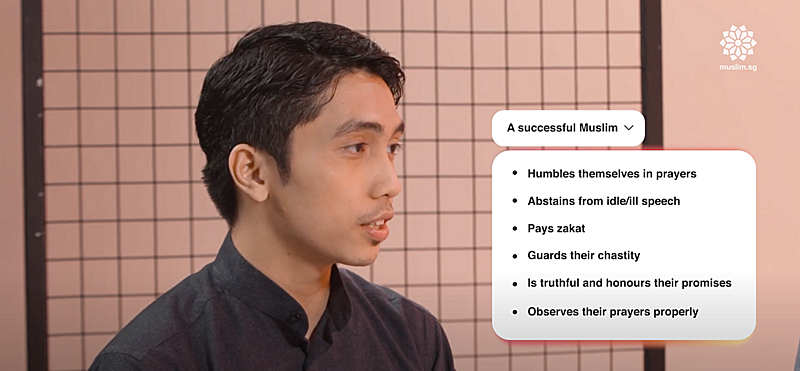
Screengrab from How to be happy and successful in life
These are descriptions of those who are successful not just because of their faith, but also because they fulfil their responsibilities in this world. We also often forget that our commitments are not just towards the outward responsibilities, the Quran reminds us of our internal responsibilities as well:
قَدْ أَفْلَحَ مَن زَكَّىٰهَا. وَقَدْ خَابَ مَن دَسَّىٰهَا
Successful indeed is the one who purifies their soul, and the one who corrupts it fails.
(Surah Ash-Shams, 91:9-10)
We need to strive to achieve success in this world, as this is the place for us to harvest our good deeds so as to reap our eternal rewards in the Afterlife. In a profound saying that is attributed to Imam Al-Ghazali in his book Ihya’ Ulum al-Din,
الدُّنْيَا مَزْرَعَةُ الآخِرَة
“The world (dunya) is a place for us to harvest for the Hereafter (akhirah)”
2. What if nobody was created for you, then you’ll be a hopeless guy?
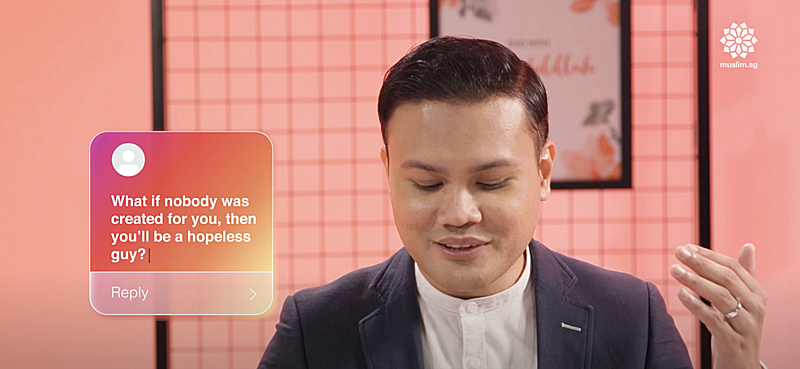
Screengrab from How to be happy and successful in life
Our worth is not defined by our marital status. After all, different people have different timelines in life. We should not lose our hope in Allah’s grace and mercy. He wills only good for us and there is always wisdom in His act of creation.
Throughout history, there are many notable figures, such as our scholars, who did not marry but lived a fruitful life full of purpose. The late Syrian scholar, Sheikh Abdul Fattah Abu Ghuddah, even wrote a book titled Ulama-ul ‘Uzzab (Scholars who did not marry), where he compiled a list of prominent figures who did not marry but left a huge impact on the intellectual heritage of Islam.
This does not mean that they rejected marriage per se. They would know more than many of us that marriage is a Sunnah (encouraged) in our religion. However, due to their respective circumstances and their intense pursuit of knowledge for the betterment of the later generations, they ended up not getting married. These are figures such as Imam At-Tabari, Imam Az-Zamakhshari, Imam An-Nawawi and Imam Ibn Taymiyyah.
As Muslims, we believe that Allah has decreed for us our own providence in this world by His wisdom and mercy, as well as our own individual timeline in life. It is important that we do not let the challenges we face make us despair and feel hopeless. Have faith and continue to make Dua for the best of what we know and what we may not know.
3. What is happiness in Islam?
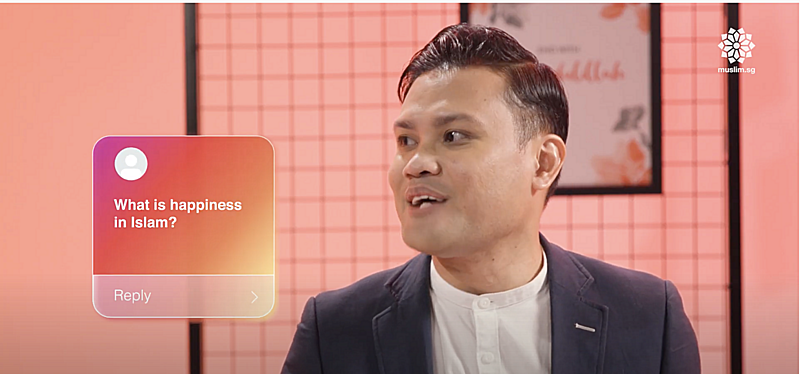
Screengrab from How to be Happy and Successful in Life
There are many definitions of happiness. The Quran has multiple terms that connote happiness, each with its own distinct meaning and significance. True happiness is mentioned in the Quran as Sa’adah:
يَوْمَ يَأْتِ لَا تَكَلَّمُ نَفْسٌ إِلَّا بِإِذْنِهِۦ ۚ فَمِنْهُمْ شَقِىٌّ وَسَعِيدٌ. فَأَمَّا ٱلَّذِينَ شَقُوا۟ فَفِى ٱلنَّارِ لَهُمْ فِيهَا زَفِيرٌ وَشَهِيقٌ. خَـٰلِدِينَ فِيهَا مَا دَامَتِ ٱلسَّمَـٰوَٰتُ وَٱلْأَرْضُ إِلَّا مَا شَآءَ رَبُّكَ ۚ إِنَّ رَبَّكَ فَعَّالٌ لِّمَا يُرِيدُ. وَأَمَّا ٱلَّذِينَ سُعِدُوا۟ فَفِى ٱلْجَنَّةِ خَـٰلِدِينَ فِيهَا مَا دَامَتِ ٱلسَّمَـٰوَٰتُ وَٱلْأَرْضُ إِلَّا مَا شَآءَ رَبُّكَ ۖ عَطَآءً غَيْرَ مَجْذُوذٍ
When that Day arrives, no one will dare speak except with His permission. Some of them will be miserable, others happy. As for those bound for misery, they will be in the Fire, where they will be sighing and gasping, staying there forever, as long as the heavens and the earth will endure, except what your Lord wills. Surely your Lord does what He intends. And as for those destined to be happy, they will be in Paradise, there to remain as long as the heavens and earth endure, unless your Lord wills otherwise- an unceasing gift.
(Surah Hud, 11:105-108)
Happiness, in this sense, signifies a state of permanence. True happiness is not equivalent to temporal joy or pleasure, but rather, it unceasingly continues forever.
This can be further explained in a hadith of the Prophet s.a.w. as he described to us the contrasting difference between someone who is truly happy and one who is miserable. After telling us the stages of how a human being comes into life in this world, four matters are written:
بِكَتْبِ رِزْقِهِ، وَأَجَلِهِ، وَعَمَلِهِ، وَشَقِيٍّ أَمْ سَعِيدٍ؛ فَوَاَللَّهِ الَّذِي لَا إلَهَ غَيْرُهُ إنَّ أَحَدَكُمْ لَيَعْمَلُ بِعَمَلِ أَهْلِ الْجَنَّةِ حَتَّى مَا يَكُونُ بَيْنَهُ وَبَيْنَهَا إلَّا ذِرَاعٌ فَيَسْبِقُ عَلَيْهِ الْكِتَابُ فَيَعْمَلُ بِعَمَلِ أَهْلِ النَّارِ فَيَدْخُلُهَا. وَإِنَّ أَحَدَكُمْ لَيَعْمَلُ بِعَمَلِ أَهْلِ النَّارِ حَتَّى مَا يَكُونُ بَيْنَهُ وَبَيْنَهَا إلَّا ذِرَاعٌ فَيَسْبِقُ عَلَيْهِ الْكِتَابُ فَيَعْمَلُ بِعَمَلِ أَهْلِ الْجَنَّةِ فَيَدْخُلُهَا
It is written about his sustenance, his lifespan, his deeds, and whether he will be happy or in misery. By Allah, besides Whom there is no other god, one of you will do the actions of the people of Paradise until there is only a cubit (length) between him and it. Then the decree will overtake him, he will do the actions of the people of the Fire and then enter it. Likewise, one of you will do the actions of the people of the Fire until there is only a cubit between him and it. Then the decree will overtake him, he will do the actions of the people of Paradise and then enter it.
(Muttafaq ‘Alayh)
Only Allah s.w.t. knows the decree. We can never know the status of our end in this world. True happiness is to achieve a blessed ending in this world and therefore, granting us a blessed outcome in the Hereafter.
A person may live a very challenging life full of hardship, but if he/she ends on a good note, then all that he/she had to go through was worth it. Subsequently, if a person only lives a life full of temporal enjoyment that contradicts Allah’s pleasure and ends on that note, then that is an unfortunate end that is not worthy to be called a life of happiness.
The Prophet s.a.w. reminds us:
وَإِنَّمَا الأَعْمَالُ بِالْخَوَاتِيمِ
The deeds (of a person), depends on its end
(Sahih Al-Bukhari)
4. I’m mentally drained, sometimes I see only a glimpse of light/happiness, what can I do?
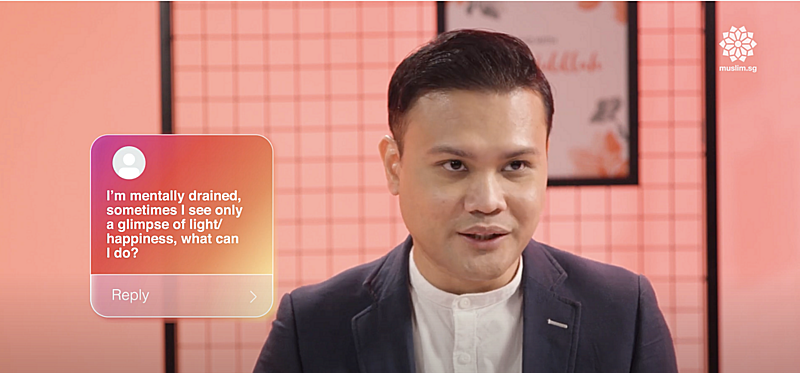
Screengrab from How to be Happy and Successful in Life
It is part of the process to develop solutions to our problems by acknowledging our present. This includes our emotions, human limitations and even our shortcomings. Know that our religion does not intend anyone to walk a self-destructive path and seeks to end everything in life. Allah s.w.t. says in the Quran:
وَلَا تُلْقُوا۟ بِأَيْدِيكُمْ إِلَى ٱلتَّهْلُكَةِ ۛ وَأَحْسِنُوٓا۟ إِنَّ ٱللَّهَ يُحِبُّ ٱلْمُحْسِنِينَ
do not put yourselves into destruction. And do good. Of course, Allah loves those who do good.
(Surah Al-Baqarah, 2:195)
This means that we should seek to take care of ourselves, physically, mentally and spiritually. Amongst many, we may observe Zikir (remembrance of Allah) in dire times to help calm ourselves, instil hope and return to mindfully looking for solutions. Zikir allows us to acknowledge that we can never go through the challenges alone. It reminds us that we need Allah and that He is always there to help us through.
When our lens to see the world is blurred, it becomes important that we should try to change our perspective of life and our priorities. Sometimes, we would need to take a break from things that affect our mental health such as social media. For example, we tend to compare ourselves to people’s highlight reels on social media and feel worse about ourselves. Instead, we can try uplifting activities such as keeping a gratitude journal to focus on the blessings of life.
However, we should seek professional help when necessary. Know that seeking help is not equivalent to failure in managing our affairs. Instead, it is part of holistic healing. Even Sayyidatina Fatimah r.a. sought help from the Prophet s.a.w. as she complained about her house chores, to which the Prophet s.a.w. advised her to observe the tasbih 33 times, the tahmid 33 times and the takbir 33 times to relieve her from fatigue.
Do seek relevant help should you require professional mental health support. It is okay not to feel okay. However, ensure we get proper help in overcoming these challenges.
For psychological and emotional support, you may contact the National Care Hotline at 1800-202-6868 or Club Heal at 6899 3463. If you would like to seek therapy, you may refer to this list for pro-bono/discounted services.
5. How to lead a good life
Undoubtedly, there will always be challenges in life, but that doesn’t mean that one cannot experience a good life. The Quran particularly mentions about ‘a good life’ in Surah An-Nahl:
مَنْ عَمِلَ صَـٰلِحًا مِّن ذَكَرٍ أَوْ أُنثَىٰ وَهُوَ مُؤْمِنٌ فَلَنُحْيِيَنَّهُۥ حَيَوٰةً طَيِّبَةً ۖ وَلَنَجْزِيَنَّهُمْ أَجْرَهُم بِأَحْسَنِ مَا كَانُوا۟ يَعْمَلُونَ
Whoever does good, whether male or female, and is a believer, We will surely bless them with a good life, and We will certainly reward them according to the best of their deeds.
(Surah An-Nahl, 16:97)
Whoever strives to do good, whether in ease or in difficulty and remains faithful to Allah s.w.t. will be granted a good life.
This is testified by the life of Prophet Muhammad s.a.w. Many of us will agree that the Prophet did not live a life of leisure and convenience. He faced challenges and betrayal from his adversaries, even when he only intended good for another. He lost two of his strongest supporters, his first love and his beloved uncle, during one of his most challenging periods. He witnessed many of his children die before him. Yet, we do not describe his life to be a life of misery. We bear witness that he lived the greatest life in human history. Until today, he remains to be the most influential person in history as described by Michael H. Hart in 'The 100: A Ranking of the Most Influential People in History'.
Conversely, in Surah Taha, Allah s.w.t. warns us:
وَمَنْ أَعْرَضَ عَن ذِكْرِى فَإِنَّ لَهُۥ مَعِيشَةً ضَنكًا وَنَحْشُرُهُۥ يَوْمَ ٱلْقِيَـٰمَةِ أَعْمَىٰ
But whoever turns away from My Reminder will certainly have a miserable life, then We will raise them up blind on the Day of Judgment.
(Surah Taha, 20:124)
6. Can you be happy even after sacrificing your worldly desires?
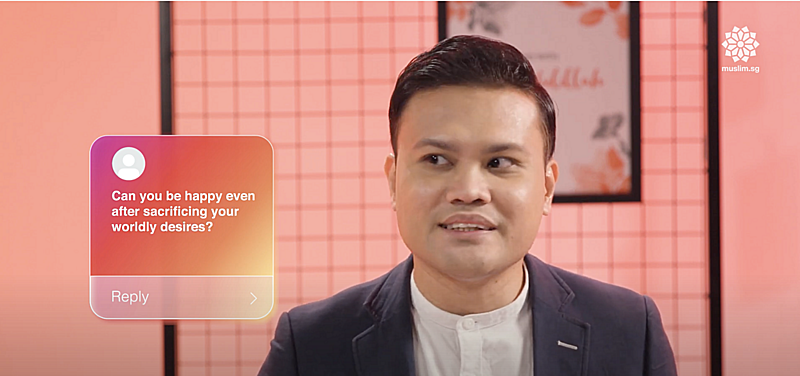
Screengrab from How to be Happy and Successful in Life
First, let us first define what are worldly desires. Not all desires that we have in this world are considered worldly desires. There are some desires that are heavenly praised as well.
With that being said, we are able to recognise that there are two categories of life, based on how we may intend to live it. The first is a life that only desires to follow and fulfil the baser-self (nafsu). These are selfish desires to only fulfil the endless pursuits of the ego. The second category is the desire to please Allah s.w.t. such as the desire to make our parents happy, to help our spouses complete the daily chores or contribute to the community in any way we can. These are praiseworthy pursuits that are not worldly - Dunya in that sense.
The Prophet s.a.w. also said in a hadith:
إِنَّكَ لَنْ تَدَعَ شَيْئًا لِلَّهِ عَزَّ وَجَلَّ إِلَّا بَدَّلَكَ اللَّهُ بِهِ مَا هُوَ خَيْرٌ لَكَ مِنْهُ
Verily, you will never leave anything for the sake of Allah Almighty but that Allah will replace it with something better
(Musnad Ahmad)
7. Is life worth living?
When Allah The Most Merciful and Compassionate created us and all the creations in this world, we know and believe that He intends good for us. There is potential greatness and beauty of our creation that Allah even appoints us as the responsible authority on earth above other creations:
وَإِذْ قَالَ رَبُّكَ لِلْمَلَـٰٓئِكَةِ إِنِّى جَاعِلٌ فِى ٱلْأَرْضِ خَلِيفَةً ۖ قَالُوٓا۟ أَتَجْعَلُ فِيهَا مَن يُفْسِدُ فِيهَا وَيَسْفِكُ ٱلدِّمَآءَ وَنَحْنُ نُسَبِّحُ بِحَمْدِكَ وَنُقَدِّسُ لَكَ ۖ قَالَ إِنِّىٓ أَعْلَمُ مَا لَا تَعْلَمُونَ
(Remember) when your Lord said to the angels, “I am going to place a successive (human) authority on earth.” They asked (Allah), “Will You place in it someone who will spread corruption there and shed blood while we glorify Your praises and proclaim Your holiness?” Allah responded, “I know what you do not know.”
(Surah Al-Baqarah, 2:30)
Each one of us is created unique. We know that there is Divine wisdom. This means that our creation is not without purpose. There is purpose in our lives.
Life cannot be worthy when we don’t live it. It is worth living especially when we live with a moral compass that is set by the Divine. Our religion facilitates us to live the best we can in this world and the next. The Prophet s.a.w. mentioned in a hadith:
عَجَبًا لأَمْرِ الْمُؤْمِنِ إِنَّ أَمْرَهُ كُلَّهُ خَيْرٌ وَلَيْسَ ذَاكَ لأَحَدٍ إِلاَّ لِلْمُؤْمِنِ إِنْ أَصَابَتْهُ سَرَّاءُ شَكَرَ فَكَانَ خَيْرًا لَهُ وَإِنْ أَصَابَتْهُ ضَرَّاءُ صَبَرَ فَكَانَ خَيْرًا لَهُ
How wonderful is the case of a believer; there is good for him in everything and this applies only to a believer. If prosperity attends him, he expresses gratitude to Allah and that is good for him; and if adversity befalls him, he endures it patiently and that is better for him
(Sahih Muslim)
While noting that life is not always easy and happiness and success may not always be present at every part of our lives, it calms us to know that Allah s.w.t. never leaves us to ponder aimlessly in life. He guides us when we strive for it. He reminds us in the Quran:
لَا يُكَلِّفُ ٱللَّهُ نَفْسًا إِلَّا وُسْعَهَا
Allah does not require of any soul more than what it can afford
(Surah Al-Baqarah, 2:286)
And Allah knows best.
Watch the full video here:

